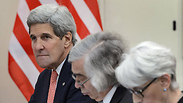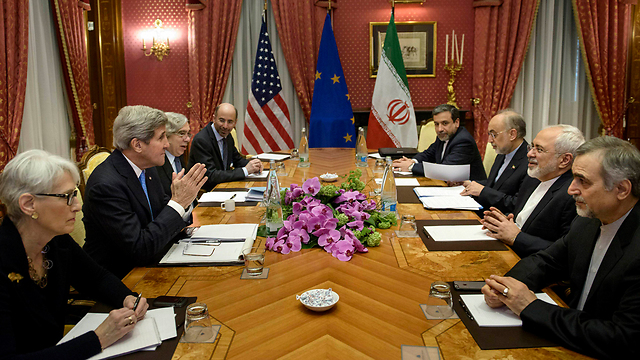
American negotiators in Lausanne. Trying to soften the criticism on the day after the agreement
צילום: AFP
The Americans are being naive about Iran
Op-ed: The US administration either believes that the supervision on Iran's nuclear program will be perfect, or that the Iranians have no intention of cheating. Either way, when the Americans talk about a historic deal, Israel and the Middle East react hysterically.
The voices coming out of Lausanne, which indicate difficulties in the nuclear negotiations, a last-minute crisis, are a misrepresentation by both sides, which are seeking to convey to the world outside the negotiating rooms: We tried, we insisted, we fought till the very last minute. The goal is to try to soften the criticism on the day after.

If there is anyone in Jerusalem who still hopes that the talks will reach a dead end, he is deluding himself. There will be an agreement. It may not be a full agreement, but only a partial one; it may be a half-page document with principles and understandings; it may end with a handshake and a commitment to fill in all the holes by June, ahead of the permanent agreement. But both sides have a clear interest for the talks to succeed.
The sky won't fall on the day after the agreement. But on the day the Americans and Iranians shake hands, Iran will cross a very significant line. It may not have a nuclear bomb in the coming years, but it will emerge from these negotiations politically reinforced vis-à-vis the other states in the region.
After the agreement, Iran will not only enjoy an economic cornucopia, but will be more arrogant, more confident in itself and more daring in its moves in the Middle East. Because those who shook its hand in the morning won't attack it in the evening. Iran can basically feel that the military threat against it has been removed.
The sanctions won't be lifted at once. The United Nations Security Council resolutions against Iran will also be handled, it seems, only after the permanent agreement is signed. But the Iranians are expecting an immediate reward, so the world powers will release several billions of dollars which have been frozen in European banks.

Nuclear talks in Switzerland. Iran may not have a nuclear bomb in the coming years, but it will emerge from the negotiations politically reinforced vis-à-vis the other countries in the region (Photo: Reuters) (צילום: רויטרס)
In general, such a diplomatic agreement between two rivals may lead to the development of a positive dynamic which will speed up the easement of the sanctions. This will be taken care of by the American administration's bureaucracy. The US Department of Treasury has been marking financial firms – shipping companies, Iranian banks and more – which are suspected of aiding the nuclear project, and imposing a complete boycott on them. The Iranians would outsmart the US and replace the companies' names, and the administration would update the list of names every few months, impose a new boycott, and so on and so forth. All the Treasury workers have to do is not be so strict about updating the boycott list frequently, and the Iranians will benefit from it.
Moreover, the Iranians are already exceeding their permitted oil export quota by 20%. So far, many countries have been careful not to get involved in illegal trade in Iranian oil. But now, the Americans can be a bit more flexible with Iranian oil flowing to friendly countries like Japan and South Korea. In order to carry out these moves, there is no need for the Congress' approval.
From the talks between American officials involved in the negotiations and Israel, we can understand how the US will explain this. The Americans claim that throughout the entire agreement period, the Iranians will be at least one year away from making a breakthrough towards a nuclear bomb. Today, they say, the Iranians are three months away from making that breakthrough, without supervision and without a long-term restricting agreement.
The American formula has three elements: Limiting the number of centrifuges, limiting the amount of enriched uranium and limiting research and development. The Iranians, the Americans claim, have 19,000 centrifuges today, 9,500 of which are active. The Iranians have agreed to go down to less than 6,000 active centrifuges, and with such an amount, the American will claim, one cannot run towards a bomb so fast. They will also stress that the Iranians have agreed to reduce the amount of enriched uranium to 5%, and to transfer the excess material, beyond the agreement, to Russia.
Moreover, they have even agreed not to replace – for six years – the old centrifuges with new and advance ones with a higher production ability. Israel is asking what will happen after six years. And why do they have to hold on to 19,000 centrifuges if they have no intention of producing huge amounts of enriched uranium in the future?
Throughout the negotiations, the Iranians insisted and succeeded in getting an understanding from the Americans that the supervision restrictions on the ongoing construction of their nuclear infrastructure will be gradually reduced over the years. Israel sees this understanding as the main hole in the agreement, as it will give the Iranians a licensed ability to redevelop their nuclear infrastructure within five years, and all the restrictions will be lifted within 10 years. And if they cheat, Israeli officials say, it will take even less time.
Israeli officials say that the clear example of the Americans' naivety, and perhaps cynicism, is the agreement they reached with the Iranians over the Fordo facility, which is much smaller than Natanz, but is the most protected facility in Iran and will allow Tehran to continue enriching uranium without the threat of a military attack. Israel demanded that the facility would be completely dismantled.
The Americans originally accepted Israel's stand, but gave in during the negotiations. While Iran agreed to limit the extent of its uranium enrichment in Fordo, it refused to disassemble even one screw. And if the Iranians decide, it could be activated within five to six months.
So the Americans either believe that the supervision on Iran will be perfect, or that the Iranians have no intention of cheating. Either way, they are being naïve. That's why when the Americans talk about a historic agreement, Israel and the Middle East react hysterically.










